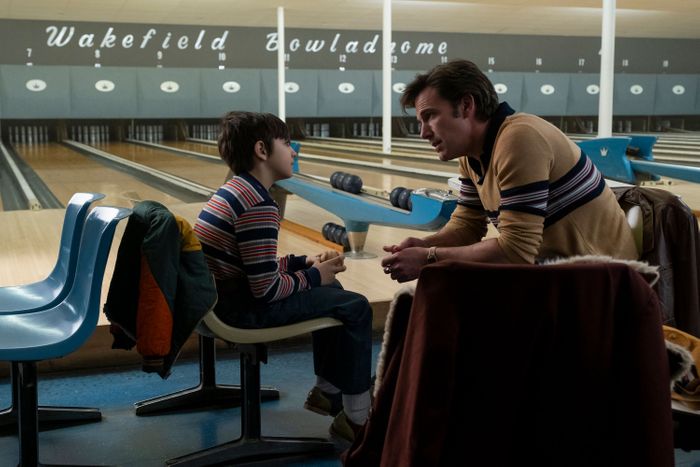
In an early scene in The Tender Bar, the young protagonist J.R. (Daniel Ranieri) sits on a stool at the Dickens, the pub where his Uncle Charlie (Ben Affleck) works, and stares wide-eyed at the numerous books stacked on the shelves. There are as many novels in this place as there are bottles of liquor to drink, and Charlie is happy to encourage J.R.’s interest in them.
“Read enough books,” he tells his nephew, “and you could become a writer.”
Immediately, voice-over narration from a grown-up J.R., provided by actor Ron Livingston, breaks into the scene. “From that moment on,” future J.R. announces, “I wanted to become a writer.”
From that scene on, if not sooner, it’s clear what kind of movie The Tender Bar is going to be: a sweet, pat, unchallenging coming-of-age story that resembles a lot of coming-of-age stories you’ve seen before, but with less depth. Adapted from J.R. Moehringer’s memoir by screenwriter William Monahan (The Departed) and directed by George Clooney, the movie, which opens in theaters nationwide Wednesday, follows J.R.’s evolution from childhood into his college years, when he’s played by Tye Sheridan. But really, this story is about the absence of a paternal figure in J.R.’s life and how he fills that hole by forming a warm, slightly cockeyed bond with his Uncle Charlie.
The problem with The Tender Bar is that it does not fully realize that exploring the nuances of that relationship is the film’s entire reason for being. Instead of zooming in extra-tight on J.R. and Charlie (the film’s most magnetic character, thanks to Affleck) and the code of masculinity that uncle passes on to nephew, The Tender Bar sprawls out, particularly in the second half when the narrative shifts to J.R.’s experiences as a student at Yale and an adult post-graduation. Increasingly one gets the sense that the film is checking off plotline boxes from the book — here’s the part where J.R. falls for a fellow student (Briana Middleton), and here’s the bit where he gets an entry-level job at the New York Times, and here are the moments when he deals with illness in his family. Too much is skimmed over rather than dug into deeply.
The Tender Bar begins in 1973 with 11-year-old J.R. and his mother, Dorothy (Lily Rabe), moving back into her childhood home on Long Island, where a swirl of equally half-broke relatives, including Dorothy’s brother Charlie and her father (Christopher Lloyd), share the modest space. Dorothy and J.R. have come here to escape from her bad marriage to J.R.’s father (Max Martini), an unreliable and abusive DJ known to New York City listeners as the Voice. Aware that J.R.’s dad is negligent, and that this is probably the nicest thing you can say about him, Charlie shines extra attention on the boy, quickly becoming the sensei to J.R.’s karate kid. Charlie drops important life lessons on him, like respect your mother, always keep a hidden stash of cash in your wallet and, “Never, under any circumstances, hit a woman, even if she stabbed you with scissors.” He meets J.R. where he is, and also makes him feel like he’s one of the grown-ups.
Affleck is naturally charming in the role, and the scenes between him and Ranieri are the strongest parts of the film. Charlie the character is a bit of a conundrum, though. The movie wants us to see him as a hero of sorts, the same way J.R. does. And there are definitely things about him to like: he’s clearly very bright, well-read, decent, and funny. But he’s also a middle-aged man still living at his folks’ place, and content to live a life filled with Saturday morning hangovers and long days spent serving the same drinks to the same people. There’s a sense that Charlie could have done more with his life and opted not to, but The Tender Bar never explains why, nor does it consider how Charlie’s own shortcomings make him so eager, like his sister, to urge J.R. toward success.
Clooney seems much more interested in keeping things pleasant than in interrogating The Tender Bar’s masculine ethos or engaging in any kind of true character study. With the possible exception of Charlie and J.R., the individuals in this indie-style effort seem less like real people than first drafts of people. Underlined by its warm, slightly washed-out visual aesthetic and a soundtrack filled with ’70s pop hits by Pablo Cruise and Steely Dan, the low-key nostalgia that runs through the picture acts as a lodestar, preventing any real engagement with its darker themes or a richer treatment of the members of the Moehringer family.
George Clooney has gone the Uncle Charlie route with The Tender Bar. He made a nice movie. But given his intellect and insightful nature, it’s obvious he could have made something more. Instead, he decided to just have a drink, hang out with the boys, and not push himself too hard. This passable but forgettable drama is the result.
More Movie Reviews
- The Thriller Drop Is a Perfect Addition to the Bad-First-Date Canon
- The Accountant 2 Can Not Be Taken Seriously
- Another Simple Favor Is So Fun, Until It Gets So Dumb


